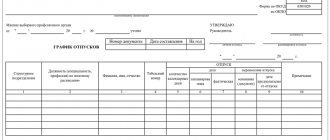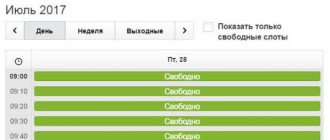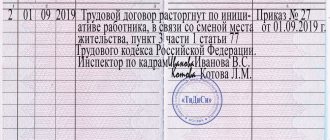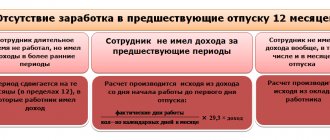Labor legislation provides for three possible options for changing the duration of vacations: recall, transfer and extension.
In some cases, the employer is obliged to extend or reschedule vacation; in other situations, the employer has the right to revoke or reschedule vacation.
In the normal business life of any enterprise, emergency situations cannot be ruled out when an employee, who is about to or has just gone on vacation, urgently needs to return to work. In this case, the employer may offer the employee to postpone the vacation (if the vacation has not yet begun) or recall him from vacation (if the employee is already on vacation).
Today we will analyze the employer’s actions when recalling from vacation and postponing vacation, so that this does not lead to violations of the employee’s right to rest and does not attract the attention of the State Labor Inspectorate.
Review from vacation
The employer has the right to recall the employee from annual paid leave. This right is granted to the employer by Article 125 of the Labor Code of the Russian Federation (hereinafter referred to as the Labor Code of the Russian Federation, Code). Recall from vacation is possible only with the consent of the employee. In case of refusal, the employee is not obliged to justify or explain the reasons and circumstances of his decision. An employee’s refusal to go to work when called back early from vacation is not a violation of labor discipline and cannot lead to disciplinary sanctions.
cannot be recalled from vacation (even with their consent) .
This:
- minor employees;
- pregnant women;
- workers engaged in work with harmful and/or dangerous working conditions.
Recall of these categories of employees will lead to administrative liability provided for in Part 1 of Article 5.27 of the Code of Administrative Offenses of the Russian Federation, in the form of a fine for the organization in the amount of 30,000 to 50,000 rubles and a fine for the official in the amount of 1,000 to 5,000 rubles.
The procedure for recalling an employee from vacation is quite simple, but the most important thing here will be the correct execution of the relevant documents. Let's break down the review process into separate steps.
Stage 1. Receipt by the head of the enterprise of an official (report) note, which states the need to recall a specific employee from vacation with an explanation of the reasons.
Stage 2. Contacting the employee. The employee can be informed of the need to take early leave either orally or in writing by sending an official letter. In any case, for the employee to make a decision, it is necessary to provide him with complete information about what happened and indicate the importance of his participation.
Stage 3. Obtaining consent. The employee's consent to the recall is a prerequisite. To prevent the emergence of controversial issues, such consent must be obtained in writing. In the consent, the employee must indicate: his data, his position, the consent itself and the date from which the employee leaves the vacation early, the desired date for the provision of the unused part of the vacation.
Stage 4. Issuing an order to recall from vacation. After receiving the employee’s consent, you can issue an order to recall him from vacation. There is no unified form for such an order, so it can be drawn up in any form with the obligatory indication of: employee data, date of recall, dates of vacation (from which it is recalled), the number of days of vacation that remain unused, dates to which, at the request of the employee, the unused part of the vacation, indicating the need to recalculate vacation pay. Such an order/instruction must be issued by the time the employee returns to work. In the order, the employee puts a mark indicating his agreement with its contents. Based on this order, changes are made to the vacation schedule and personal card.
The part of the vacation unused in connection with the recall must be provided at the employee’s choice at a time convenient for him during the current working year or added to the vacation for the next working year (Part 2 of Article 125 of the Labor Code of the Russian Federation).
Therefore, in connection with the call from annual paid leave, as well as the need to provide unused vacation days, changes are made to the vacation schedule and personal card.
From the moment of early return to work, the employee must be paid wages for the time actually worked . Part of the vacation pay in the form of average earnings for unused vacation days becomes overpaid. The employer does not have the right to offset this amount against wages for time worked after recall from vacation or against future vacation pay, since in essence this will be a deduction, and Article 137 of the Labor Code of the Russian Federation does not provide for such a basis for deduction. Thus, vacation pay needs to be recalculated .
After all, unused vacation days will be provided at another time. The amount of vacation pay will be determined based on a different billing period. An employer may have a question: is it necessary to make payment for work on the day the employee is recalled from vacation? The answer to this question was given by judicial practice, indicating the following.
By virtue of Part 2 of Article 125 of the Labor Code of the Russian Federation, recall of an employee from vacation is allowed only with his consent. The part of the vacation unused in this regard must be provided at the employee’s choice at a time convenient for him during the current working year or added to the vacation for the next working year.
Based on the literal interpretation of this norm, payment for work on the day of vacation when an employee is recalled from it is not provided.
Moreover, when an employee is granted vacation (in this case, the plaintiff went on another paid vacation), he is paid for all days of vacation, therefore, the day of vacation on which the employee was recalled is also already paid for him. (Appeal ruling of the Investigative Committee for civil cases of the Volgograd Regional Court dated 04/03/2015 in case No. 33-3464/2015)
It is possible to recall an employee from vacation, unless this leads to the fact that each part of the actually used vacation will be less than 14 calendar days. We remind you that at least one part of the vacation must be at least 14 calendar days (Part 1 of Article 125 of the Labor Code of the Russian Federation).
Duration of rest.
Article 115 of the Labor Code of the Russian Federation guarantees employees annual paid leave while maintaining their place of work (position) and average earnings. The minimum duration of the main vacation is 28 calendar days. At the same time, some categories of workers are guaranteed by labor legislation to have longer vacations:
- for minor workers (Article 267 of the Labor Code of the Russian Federation) – 30 calendar days;
- disabled employees (Article 23 of Federal Law No. 181-FZ of November 24, 1995 “On Social Protection of Disabled Persons in the Russian Federation”) – 30 calendar days;
- teaching staff (Article 334 of the Labor Code of the Russian Federation and Decree of the Government of the Russian Federation dated May 14, 2015 No. 466) - from 42 to 56 days (depending on the category of educational organization and position);
- state and municipal employees (federal laws dated 02.03.2007 No. 25-FZ “On municipal service in the Russian Federation”, dated 27.07.2004 No. 79-FZ “On the state civil service of the Russian Federation”).
In addition to the main leave, employees are entitled to additional paid leave under certain conditions. Article 116 of the Labor Code of the Russian Federation guarantees the provision of such leave to employees:
- employed in work with harmful and (or) dangerous working conditions (at least seven calendar days (Article 117 of the Labor Code of the Russian Federation));
- having a special nature of work - its minimum duration is determined by the Government of the Russian Federation (Article 118 of the Labor Code of the Russian Federation);
- workers with irregular working hours (at least three calendar days (Article 119 of the Labor Code of the Russian Federation));
- working in the regions of the Far North and equivalent areas (Article 321 of the Labor Code of the Russian Federation);
- athletes, coaches (at least four calendar days (Article 348.10 of the Labor Code of the Russian Federation)).
Other cases of granting additional paid leave are determined by other federal laws (for example, leave for long service or length of service).
The duration of the annual main and additional paid leaves of employees is calculated in calendar days and is not limited to a maximum limit. When calculating the total duration of annual paid leave, additional paid leaves are summed up with the annual main paid leave (Article 120 of the Labor Code of the Russian Federation).
For your information:
For employees who have entered into fixed-term employment contracts for a period of up to two months (Article 291 of the Labor Code of the Russian Federation) and seasonal workers (Article 295 of the Labor Code of the Russian Federation), the duration of annual leave is determined at the rate of two working days per month of work.
Error 1. Failure of employers to provide additional leave.
This is a violation of the Labor Code of the Russian Federation. Employees, turning to the State Labor Inspectorate or the court, will easily restore justice. Thus, the employer did not provide additional leave for work in the Far North (24 days), believing that it was compensated for by shortened working hours. However, the court indicated that leave cannot be compensated in this way: the employer is obliged to provide it (Appeal ruling of the Supreme Court of the Republic of Sakha (Yakutia) dated September 20, 2017 in case No. 33-3637/2017).
And by the appeal ruling of the Supreme Court of the Russian Federation of the Republic of Bashkortostan dated June 24, 2014 in case No. 33-8859/2014, compensation was recovered from the employer for unprovided additional leave. The employer thought: since the employee performs work in the Far North on a rotational basis, he does not have the right to such leave. However, the court indicated that even in this case, employees have the right to additional leave.
Transfer of vacation
The transfer of leave implies that the number of days that were not included in the leave used by the employee is subsequently provided separately or by adding to the next annual paid leave.
Important! Postponement of vacation is not a cancellation of vacation.
such a basis for transferring vacation as production necessity . The Code contains a very vague wording - “in exceptional cases when the provision of vacation to an employee in the current year may adversely affect the normal course of work of an organization or individual entrepreneur.”
In this case, it is also necessary to obtain the employee's consent .
For this reason, vacation may be transferred to the next working year. limitations here :
- the employer must obtain the employee’s consent to this (either in the form of a statement or an inscription on a document that justifies the transfer of leave);
- leave must be used no later than 12 months after the end of the working year for which it is granted (Part 3 of Article 124 of the Labor Code of the Russian Federation);
- It is prohibited to fail to provide annual paid leave for 2 years in a row, as well as to employees under the age of 18 and employees engaged in work with harmful and (or) dangerous working conditions (Part 4 of Article 124 of the Labor Code of the Russian Federation).
The procedure for transferring vacation:
- The emergence of a situation requiring rescheduling of vacation and its confirmation. To document the existence of such an “exceptional case,” we recommend, for example, drawing up memos addressed to the head of the organization describing the situation that is developing at the enterprise, as well as indicating the adverse consequences if the employee goes on vacation.
- Contacting the employee. After drawing up such a note, it is necessary to contact the employee either in writing or orally with an appropriate proposal and new vacation dates, which also must be agreed upon with the employee. If the employee agrees to postpone the vacation, such consent must be requested in writing.
- If the employee’s consent is received, an order is issued to postpone the vacation. An order to transfer vacation is drawn up by the employer in any form. It must indicate: the basis for the transfer, the new vacation period. employee details and position.
The details of the order to transfer the employee’s vacation must be indicated in column 8 of the unified vacation schedule
.
Also in the schedule
you must indicate the new start date of the vacation (column 9).
Moreover, if an order was previously issued to grant the employee leave, it must be cancelled.
As we can see from the article, the procedure for recalling a vacation and rescheduling a vacation does not involve any difficulties, but does require the execution of a certain number of documents. The recall of an employee from vacation and the transfer are influenced, first of all, by the production process. But in any case, the final decision remains with the employee.
If in the presented situations, recall from vacation and transfer of vacation is the right of the employer, which, however, is exercised with the consent of the employee, then in the next issue we will analyze situations when the employer will be obliged to postpone or extend the employee’s vacation at his request.
Legislative justification
In determining the reasons for such a transfer, the Labor Code of the Russian Federation provides for three main factors:
- transfer of the SOO at the initiative of the employee himself;
- a change in the schedule by decision of the management of a company or institution due to the need that has arisen is associated with production activities, business trips or emergency situations requiring mandatory return of personnel from vacation.
- transfer of the EOO due to circumstances that arise that are considered force majeure. These are natural disasters, social unrest, i.e. factors that the company or its employees cannot predict, much less prevent.
In each of the above cases, changes to the EEO schedule can be strictly regulated (to the extent that they do not contradict the Labor Code) by the company’s charter, collective agreement, job description, or management order. In any case, the transfer of SOO, including production necessity, can be carried out only upon reaching a compromise and agreement between the employee and his employer.
Revocation, transfer and extension of leave: what, when and how?
The concept of “transferring vacation” is given in the previous issue, while extending vacation assumes that the number of days by which the vacation should be extended is added to the annual paid leave in such a way that there is no break between the days of “extension” and the vacation itself (i.e. . the employee does not go to work)
Article 124 of the Labor Code of the Russian Federation determines that extending or postponing vacation is possible and is the responsibility of the employer in the following cases :
- temporary disability of the employee;
- the employee performs state duties during his annual paid leave, if for this purpose the labor legislation provides for exemption from work (such may be: jury duty, participation in a trial as a witness, military training, participation in the work of election commissions);
- in other cases provided for by labor legislation and local regulations.
If no questions arise with the first two cases of transfer or extension, then the possibility of a broad interpretation of the last paragraph may cause difficulties for both the employer and the employee.
To resolve such situations, the Ministry of Labor and its structural divisions issue letters. Thus, the Letter of the Federal Service for Labor and Employment dated 06/01/2012 No. PG/4629-6-1 “On extending leave in case of caring for a sick family member” states that the obligation to extend leave by the number of calendar days of incapacity for work, if temporary incapacity occurred during the period of annual paid leave, arises for the employer only in the event of temporary disability of the employee himself. Consequently, such a case as the illness of a family member may be provided for in a local regulatory act adopted by the employer in the prescribed manner as a basis for extending annual paid leave; the mere fact of illness of an employee’s family member does not give him the right to extend or postpone the leave.
Also, undergoing a medical examination during the vacation period (in the absence of signs of temporary disability) is not a basis for extending or postponing vacation by force of law.
an obligation to extend or postpone leave when an employee combines work and study at an educational institution of higher professional education that has state accreditation. Guided by Article 173 of the Labor Code of the Russian Federation, the employer is obliged to provide the employee with study leave. If this vacation falls on the main paid vacation, then the employer must either extend the main vacation for the duration of the study leave or postpone it to another period. It is important to remember that study leave cannot be transferred, since it is granted on the basis of a summons certificate.
There are circumstances in which the employer has an obligation to postpone vacation if the employee submits a corresponding application:
- the employer did not transfer payment to the vacationer for the vacation in a timely manner, that is, later than 3 calendar days before the start of the vacation (Part 2 of Article 124, Article 136 of the Labor Code of the Russian Federation).
- the employee was warned about the start time of the vacation less than 2 weeks before it began (part 2 of article 124 of the Labor Code of the Russian Federation).
In most cases, it is the employee who initiates the transfer of vacation. The employee draws up an application to postpone the vacation and submits it to the employer. In this situation, the employer is not obliged to postpone the vacation, but has the right to agree with the employee.
Types of production necessity and situations causing it
Based on Art. 72.2 of the Labor Code of the Russian Federation, the employer has the right to transfer a subordinate to a position for a period of up to 1 calendar month, even if this is not stated in the subject’s employment agreement. At the same time, the employee’s consent is not mandatory. A written agreement is only necessary if the employed person is transferred to a position with lower qualifications than his current job requires. Thus, translation in case of production necessity is carried out in the following circumstances :
emergency situations caused by natural or man-made accidents;- fires and earthquakes;
- mass starvation;
- various epidemics.
In fact, it refers to any circumstances in which the inhabitants of a state are exposed to serious danger. Measures taken in these conditions are aimed at eliminating negative impacts on people's health and lives.
There are often situations when employers use the concept of production necessity in order to attract subordinates to additional work. However, this category can only be used if the following grounds exist:
- emergency incidents that are civil in nature or lead to the introduction of martial law;
- natural disasters;
- production downtime for any unforeseen reason;
- the need for an employee to replace his absent colleague due to an emergency;
- restoration of property that has been damaged and is owned by the business entity.
Production necessity is a forced measure. Manipulations with the reshuffling of personnel within the company without significant reasons for this are unlawful.
Extension or transfer?
The article of the Labor Code of the Russian Federation, while listing cases of extending or postponing vacation, does not indicate when vacation needs to be extended and when it needs to be postponed.
Any regulations since the adoption of the current Labor Code of the Russian Federation do not answer this question. However, as is known, many regulations issued during the existence of the Soviet Union are still in force (but with significant restrictions). Thus, Article 18 of the Rules on regular and additional vacations approved by the People's Commissariat of Labor of the USSR on April 30, 1930 N 169 indicates that if the reasons preventing the employee from going on vacation occurred before it began, then the new period of vacation is determined by agreement of the employer with employee. If these reasons occur while the employee is on vacation, then the period for returning from vacation is automatically extended by the corresponding number of days, and the employee is obliged to immediately notify the employer about this.
Indeed, the provisions of the Rules meet the requirements of logic: it is impossible to extend a vacation that has not even begun yet, therefore, such a vacation can only be postponed. However, if the vacation has begun, then it is possible to either transfer unused days to another period or extend it, because Article 124 of the Labor Code of the Russian Federation allows for both options. Therefore, the Rules on regular and additional leaves should not be considered as a restriction for the employee and the employer to resolve the issue through negotiations and the adoption of mutually beneficial conditions.








